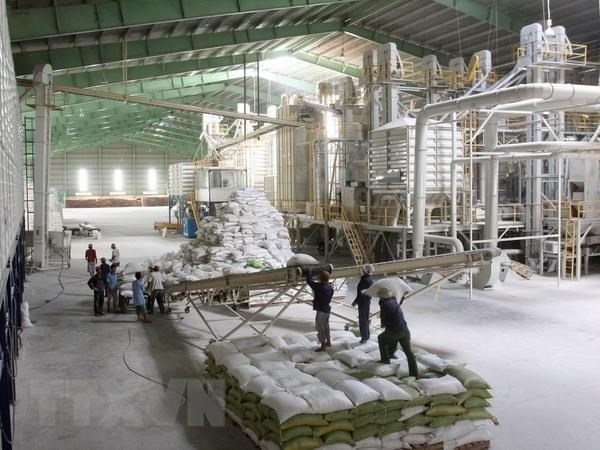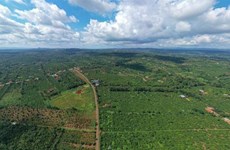Equitisation of SOEs expected to fulfill targets in final stage
Hanoi (VNA) – Since 2016, the equitisation and divestment have been carried out at 35 out of 127 State-owned enterprises (SOEs), equivalent to 27.5 percent, while 88 out of 405 firms have completed divestment, or 21.8 percent of the plan for 2016-2020.
 Following its equitisation, Vietnam Dairy Products JSC develops strongly and is assessed by Forbes Vietnam as the best listed company in Vietnam for the seventh year in a row.
Following its equitisation, Vietnam Dairy Products JSC develops strongly and is assessed by Forbes Vietnam as the best listed company in Vietnam for the seventh year in a row.(Photo: VNM/VietnamPlus)
According to Nguyen Hong Long, Vice Chairman of the Steering Committee for Business Innovation and Development, the list of businesses with State ownership subject to divestment for 2017-2020 in accordance to the Prime Minister’s Decision No. 1232/QD-TTg is a channel while there are many other channels for divestment for the economy.
“At present, it is not satisfactory to evaluate that the equitisation and divestment of State capital lag behind schedule. The experience from the previous period showed that the first three years saw the slow progress but it was sped up rapidly in the two final years thanks to earlier preparations,” Long said at a workshop on equitisation hosted by the Government Portal on August 22.
Sharing Long’s views, but Pham Duc Trung, Director of the Central Institute for Economic Development (CIEM)’s Enterprise Innovation and Development Department said: “With the above-said results, the equitisation and divestment of State capital have lagged behind schedule of each year. I believed that at the end of this period, we can reap success in terms of number but we are still concerned over the sale of stake as the volume remains low as compared to the approved figures”.
Trung cited the case of the Song Da Corporation as an example. The corporation offered more than 219 million shares for its IPO, equivalent to 48.82 percent of the firm’s chartered capital, but it successfully sold only 0.37 percent of the shares.
“The sale of shares of SOEs fails to reach their plans will affect the restructuring of State capital in more reasonable sectors,” he said.
According to experts, the slow progress was partly due to tougher regulations on equitisation in a bid to ensure the targets, efficiency and transparency. In addition, a number of ministries, sectors and localities have faced difficulties in determining the values of land use and enterprises. Meanwhile, leaders of several SOEs have been afraid of bearing responsibility when dealing with prolonged affairs during the process of equitisation.
Trung also pointed out objective reasons for the slow progress of equitisation such as the weak absorbability of the market during the period. Besides, the business performance of several SOEs before equitisation has failed to attract investors. Meanwhile, there remained policy shortcomings in the determination of cultural, historical and brand values.
 Vietnam Southern Food Corporation (Vinafood 2) successfully sells all of 114.8 million shares offered in its IPO, equivalent to 22.97 percent of the company’s charter capital.
Vietnam Southern Food Corporation (Vinafood 2) successfully sells all of 114.8 million shares offered in its IPO, equivalent to 22.97 percent of the company’s charter capital. (Photo: VNA)
To actively provide information about the equitisation of SOEs and identify difficulties and obstacles during the process of implementation, ministries, sectors and localities have taken drastic measures in an effort to accomplish the set targets.
In mid-August, Prime Minister Nguyen Xuan Phuc signed Decision 26/2019/QD-TTg approving the list of 93 enterprises subject to equitisation by the end of 2020. Of those, the State holds more than 65 percent of charter capital in four enterprises, 50-65 percent of charter capital in 62 businesses, and less than 50 percent of charter capital or no stake in 27 firms.
According the decision, the Prime Minister asked the Ministry of Planning and Investment, the Ministry of Finance and the Steering Committee for Business Innovation and Development to send quarter reports and final reports before September 30, 2020.
“The equitisation must be implemented in an open and transparent manner and in line with Party Central Committee’s resolution. The preparation is very important and the first is the awareness so SOEs should take the initiative in restructuring in conformity with Land Law, thus helping to speed up the equitisation process, said Dang Quyet Tien, Director of the Corporate Finance Department under the Ministry of Finance.
Tien also pointed to the loose coordination between agencies representing the State capital ownership and the People’s Committees of provinces and cities. Therefore, the government needs to make clearer decentralization, he suggested./.













